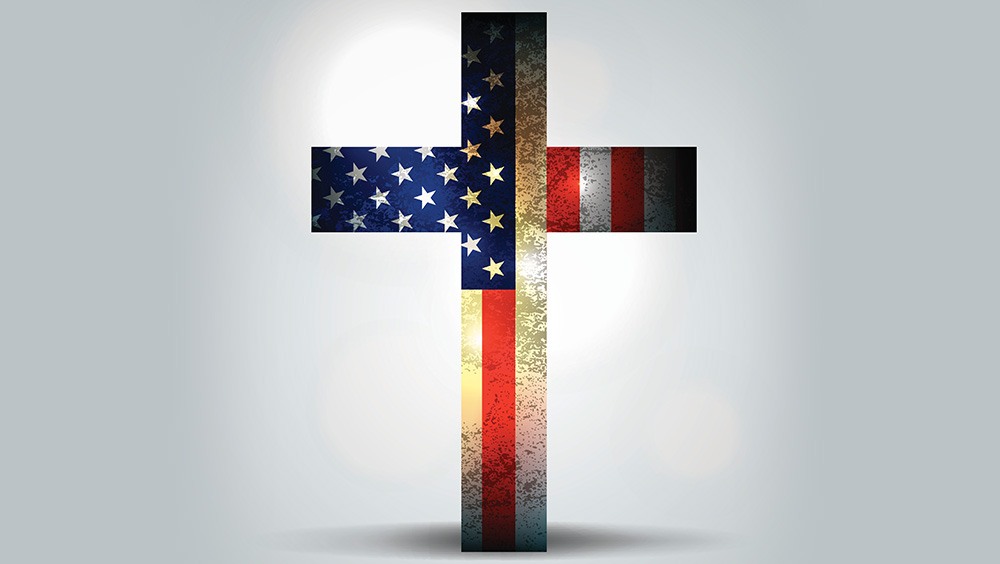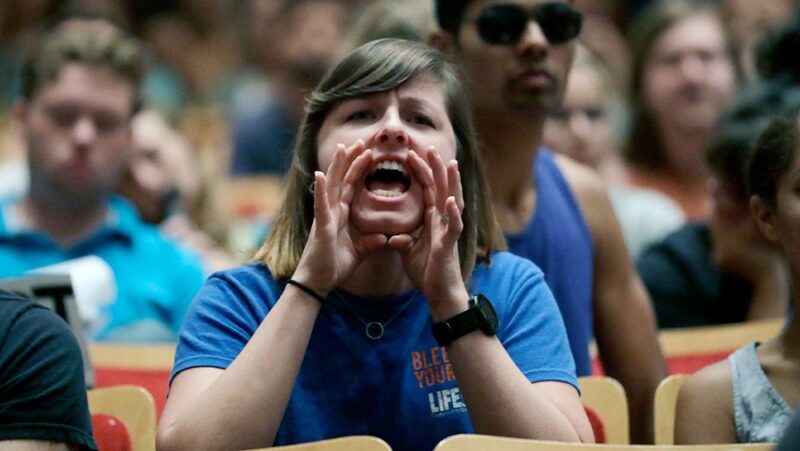What Is Christian Nationalism? The Complete Guide

Freedom of religion is the first of five freedoms guaranteed by the First Amendment. It means the government can’t require or favor any one religion, and it protects the right to live by your own religious beliefs or none at all.
Similarly, though the phrase “separation of church and state” is not included in the U.S. Constitution, the idea is embedded in our legal system: The government is run by the people and its elected representatives, not any church.
How does that square with “Christian nationalism,” a phrase seen and heard often in recent years? How does the idea of a religion at the center of national decision-making sit with the First Amendment? What is Christian nationalism, exactly?
We answer those questions, and more, here.
What is Christian nationalism?
There is no clean and tidy definition of Christian nationalism since it is not a formal religious denomination or sect with a stated doctrine of beliefs; nor is there any single person or council leading Christian nationalism that oversees followers.
Generally, religious scholars, sociologists and others who study Christian nationalism describe it as a belief that the United States is a country defined by Christianity. In practice, this means:
- The government should take steps to keep the country’s Christian roots and identity intact.
- The government should advocate Christian values and pass laws and enact policies that reflect those values.
- The separation of church and state is not a formal law that should be followed.
- God’s plan is for the U.S. to be a successful nation based in Christian ideals.
Sociologists Andrew Whitehead and Samuel Perry used survey data of people responding to questions around those prompts and described people more accepting of them as supportive of Christian nationalism. Their work defines it as being more about political outcomes than a specific belief in religion and spirituality.
The term Christian nationalism is often used to describe another person’s political and religious beliefs rather than as a label someone uses for themself.
Writing in Christianity Today, Georgetown University scholar Paul D. Miller outlined it this way: “The term ‘Christian nationalism,’ is relatively new, and its advocates generally do not use it of themselves, but it accurately describes American nationalists who believe American identity is inextricable from Christianity.”
Political scientist Eric L. McDaniel of the University of Texas at Austin describes Christian nationalism as going beyond religious belief and patriotism and into “a worldview that guides how people believe the nation should be structured and who belongs there.”
RELATED: Is America a Christian Nation?
Does Christian nationalism violate the First Amendment?
Whether Christian nationalism violates the First Amendment is a tricky question.
The First Amendment protects people’s deepest beliefs and protects petitioning for laws and policies that one believes in. Believing in Christian nationalism doesn’t violate the First Amendment.
But the First Amendment also prevents government from establishing a national religion. Passing a law based on Christian nationalism may or may not violate the First Amendment. Courts decide whether a government action or law violates the Constitution.
What is not in question is that the First Amendment and the Constitution overall prevent:
- Establishing one faith as the official national religion of the U.S. (First Amendment establishment clause).
- Stopping you from practicing your preferred religion or forcing you to practice any religion at all (First Amendment free exercise clause).
- Requiring a religious test or oath for an elected office (U.S. Constitution Article 6).
What could Christian nationalism look like in practice?
There is no single Christian nationalism agenda that outlines specific policies and laws that believers wish to enact. Some adherents and prominent people who self-identify as Christian nationalists have suggested certain policies that attract media attention. However, generally the ideas of Christian nationalism are broad-based things like “keeping America’s Christian identity intact,” rather than passing particular laws.
If laws were proposed, they could be allowed under the First Amendment or could directly violate it. Consider some possibilities using a green, yellow or red-light designation.
| Green light: protected by the First Amendment. | |
| Yellow light: caution, those 45 words might not apply. | |
| Red light: no First Amendment protection. |
Prayer in public schools
Green light: Prayer is already allowed in public schools. Students are free to pray in groups or by themselves provided it is not disruptive and doesn’t interfere with other students’ rights. Teachers can pray in schools if that prayer is private and doesn’t require or pressure students to join.
Red light: Requiring prayer in schools is different than allowing it. The First Amendment prevents public schools from requiring students to pray (for example, at the start of the day over an intercom) or pressuring them to pray. Also, a law that allows students to only pray a certain way or bars prayer of a certain religion would violate the First Amendment.
In 2023, a West Virginia school district settled a lawsuit from students who said they were forced to attend a Christian revival held at the school during school hours from The Fellowship of Christian Athletes. The district agreed to require stronger religious freedom and First Amendment training for staff.
Religious monuments in public spaces
Green light or
yellow light: Monuments depicting religious images are generally allowed in public spaces provided they are not done so at the exclusion of other religions. However, in 2003, a federal court ruled that a display of the Ten Commandments at the Alabama Supreme Court violated the First Amendment. The judge who displayed it – installing it in the middle of the night without other justices’ knowledge – was removed from office for judicial misconduct after refusing to follow the federal court’s ruling.
Red light: Barring the religious monument of any one religion while allowing others would likely violate the First Amendment. In Iowa, The Satanic Temple placed a display in the state capitol, which was allowed, along with displays from other groups. The Satanic Temple display sparked outcry from people who said it was not a protected religious display and should be removed. A Mississippi man was charged for vandalizing it. Despite its name, The Satanic Temple doesn’t follow or worship Satan or any god. It’s one of several lesser-known religions that have been recognized as having First Amendment protections.
Church-run public charter schools
Yellow light: Public charter schools are run using taxpayer dollars, but they operate outside the normal school district and are overseen by an elected board. In 2023, Oklahoma became the first state to grant a public charter school to a religious group run by the Catholic Church. Oklahoma’s attorney general challenged its legality under the state constitution and the First Amendment. In June 2024, the state Supreme Court ruled against the church-run school, saying its use of public funds was unconstitutional and “a charter school must be nonsectarian.”
Three days later, the state’s top education official unveiled a new policy mandating all public schools to teach the Bible in grades five through 12. Ryan Walters, the state’s elected superintendent, said in a written order to school districts that “immediate and strict compliance is expected.” Both Oklahoma issues involve questions of religious instruction in public education that federal courts, including the U.S. Supreme Court, could rule on in the future.
RELATED: Can the Government Fund Religious Schools?
Criminal laws based in biblical teaching
Green light: Many criminal statutes, such as those relating to murder and theft, at the national and state levels are already drawn out of general religious teachings about morality and punishment.
Red light: Directly tying an offense and its punishment to any one religion’s ideology would likely violate the First Amendment. For example, a law that specifies an act is illegal because of one religion’s teachings and requires punishment directly tied to that same religion’s doctrine would likely be unconstitutional.
Establishing Christianity as the official religion
Red light: This violates the First Amendment’s establishment clause.
Barring anyone who is not Christian from holding public office
Red light: This violates Article 6 of the U.S. Constitution. The only way to change that is to amend the Constitution, which is an intentionally difficult process.
Are all evangelical Christians also Christian nationalists?
Christian nationalism is not synonymous with evangelical Christianity. However, like Christian nationalism, there is no single leader or central doctrine in evangelical Christianity, which involves multiple Christian denominations, including Pentecostal, Anabaptist and Charismatic traditions, according to the National Association of Evangelicals.
As a voting bloc, evangelicals have trended toward the Republican Party and more socially conservative positions in recent decades. But connecting the ideas of Christian nationalism directly to evangelical Christianity is incorrect.
The Pew Research Center regularly polls on religion and spirituality in politics and public life. Its 2022 research on opinions around America as a Christian nation and Christian nationalism show differences among various religious and demographic groups, including:
People who say the founders intended the U.S. to be a Christian nation:
- All U.S. adults: 60%
- All Christians: 69%
- White evangelicals: 81%
People who say the U.S. should be a Christian nation now:
- All U.S. adults: 45%
- All Christians: 62%
- White evangelicals: 81%
People who have not heard or read anything about Christian nationalism:
- All U.S. adults: 54%
- All Christians: 59%
- White evangelicals: 57%
People who have a favorable versus unfavorable view of Christian nationalism:
- All U.S. adults: 5% versus 24%
- All Christians: 7% versus 15%
- White evangelicals: 10% versus 12%
Data from the Public Religion Research Institute reveals higher levels of support for Christian nationalism by white evangelicals compared to other religious groups. PRRI’s 2023 survey showed:
People who are adherents to or sympathizers of Christian nationalism:
- All Americans: 30%
- White evangelicals: 66%
- Hispanic Protestants: 55%
- Black Protestants: 39%
- Latter-day Saints: 42%
- White Catholics: 31%
- Hispanic Catholics: 25%
Christian nationalism and the First Amendment
Religion plays a major role in U.S. public life and in the country’s history. It is the first of five freedoms in the First Amendment. And even though the separation of church and state is not directly mentioned in the Constitution, its ideas are present in politics and public policy.
Christian nationalism is not a new idea, though its prominence in news coverage and among some elected officials has grown in recent years. A belief that the U.S. is a country founded on Christian religious principles and wanting policy and the broader culture to reflect those ideals is not necessarily incompatible with religious freedom. But government imposing any one belief system on others – and taking away someone’s freedom to practice their own religion or choose not to – brings church and state closer than the First Amendment allows.
Scott A. Leadingham is a Freedom Forum staff writer. He can be reached at [email protected].
Heckler’s Veto: Shouting Down Controversial Speakers
Are Religious People Really Ignorant About Religion?
Related Content
$30,000 Giving Challenge
Support the Freedom Forum’s First Amendment mission by Dec 31st and double your impact.

